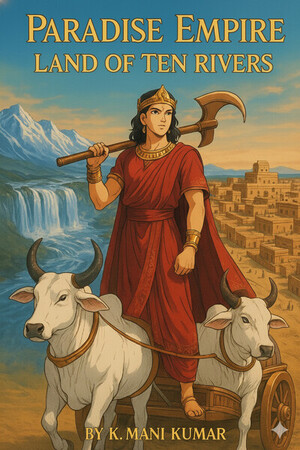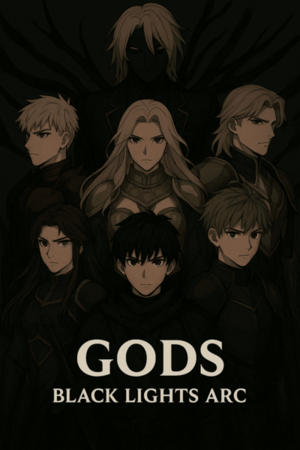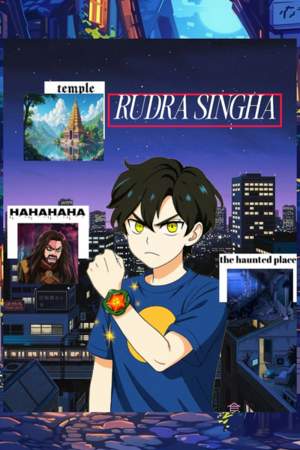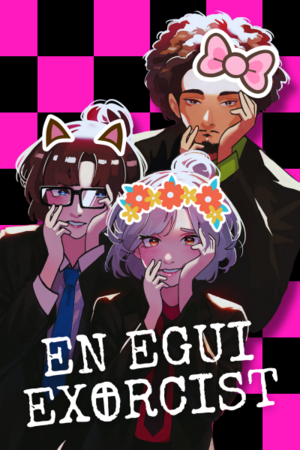Chapter 5:
Chapter 3: Journey Toward Destiny — Part 1
The Paradise Empire: The Land of Ten Rivers season 1 part 1
Chapter 3: Journey Toward Destiny — Part 1
A Thread of Destiny
(Scene opens: Present-Day Manūrū. Early morning. The time just before sunrise during the harvest festival month, marked by the faint scent of bonfire smoke. We are at the same ancient banyan tree.)
The air was cool, carrying the sharp, woodsy aroma of the nearby hearth fires where the festival offerings were already being prepared. Under the immense, sprawling canopy of the banyan, the Boy shifted on his wooden bench, his eyes wide and anxious, fixed on the old man beside him. The narrative thread of the previous chapter — Vīra’s sudden, weighty decision — had left the Boy breathless.
Boy: “And now, this is how? His journey begins? Grandpa?”
The Grandfather, whose voice was as smooth and worn as the stones of the temple he often described, gently nodded. He took a slow breath, letting the moment settle before the story’s wheel turned again.
Grandfather: "Yes, my boy. A journey of a human... that becomes a god. Remember, some journeys start small but end as epics. And even Vīra and Tim’mayya, standing there at the edge of their village, didn’t expect much from this journey. They saw only a simple trade trip; destiny saw the first step of a god.”
The Custom of the Coconuts
(Scene shifts: Ancient Manūrū. Mid-morning, around 10:15 AM. The sun is already high, turning the sky a brilliant, hot blue.)The central square was bustling with mid-morning activity. At its heart stood the grand temple of the village deities — Manūrāyya and Manūramma, the revered guardians of the land.
In the bright, mid-morning light, the great racing bullock chariot stood ready — its two majestic white-humped zebus stamping the earth impatiently. Vīra stood before the opened wooden doors of the temple, his hands pressed together, deep in silent devotion.
He was interrupted by the rapid drumming of feet and a familiar, frantic voice cutting through the stillness.
Tim’mayya (calling out): “Vīra! Vīra!”
Tim’mayya arrived, slightly breathless.
Tim’mayya: “There you are! Uncle and Aunt told me I would find you here! What are you doing here? We have to go today, remember? The goods have been prepared, we might get—”
Vīra cut him off in the middle of his rush, his voice low and firm, echoing the seriousness of the moment.
Vīra: “I am doing what I must do. Do you forget? It is the village custom to pray and give offerings to our guardian deities, Manūrāyya and Manūramma, before starting something new — especially a journey this long. So, let me finish, Tim’mayya.”
Tim’mayya’s usual scatterbrained energy deflated slightly. He rubbed the back of his neck.
Tim’mayya: “Oh... yes, right. This is your first time going to Maniyanūru for trading, isn’t it? I completely forgot about it.”
Vīra simply nodded. He knelt and took five fresh coconuts from a basket beside him. He began the ritual, hitting the first coconut sharply against the stone, breaking it cleanly. He did this four more times — the cracks sounding like sudden, sharp reports in the quiet morning.
He gathered the broken pieces and handed them, still dripping with water, to the Temple Priest, who was just coming out from inside.
The Priest, a thin, elderly man whose smile crinkled the corners of his eyes, took the offerings inside to present to Manūrāyya and Manūramma. He returned a moment later, carrying five halves of the coconuts — the holy prasādam — and gave them to Vīra.
Priest: “May the gods bless you, Vīra. Take care of yourself in that city. You’ve never gone there before.”
Vīra: “I know.”
Tim’mayya (stepping forward, gesturing wildly): “Pūjāri Gāru (Revered Priest), you tell him to be careful! No, no — I should be careful with him! His actions might put both of us in danger!”
The Priest merely smiled wider and retreated back into the sanctity of the temple, leaving the two friends to their familiar sparring.
Honor and Heroes
Vīra looked at Tim’mayya, a mixture of genuine frustration and familiar amusement on his face.
Vīra: “Really? I am a troublemaker to you?”
He started toward the chariot. Tim’mayya followed, matching his stride.
Vīra: “What wrong have I ever done?”
He stepped up onto the flatbed of the chariot, his hands reaching instinctively for the reins. Tim’mayya climbed in beside him.
Tim’mayya: “What things have you not done, Vīra? What things are left to do anymore?”
Vīra took a firm hold of the rope, the chariot beginning to move as the powerful zebus responded to the slightest pressure.
Vīra: “Tell me this — did I ever go after any girl in our village? Did I ever try to make one of them fall for me? Did I ever steal anyone’s goods, or harm anyone?
I have done only what brings honor to our family. I won every village contest every year, defeated other villages, and brought glory to our name. I followed my parents’ words as divine orders and cared for our family. I tried my best never to bring shame to our house or our village.”
Tim’mayya (sighing, folding his arms): “Calm down, Vīra. I never said you did anything dishonorable. Your problem is you create too much honor. You’re too much of a hero — and heroes attract trouble. Like those thieves yesterday!”
As they were talking, they arrived at Vīra’s simple, warm-looking home. His parents, along with Tim’mayya’s parents, were waiting outside.
Blessings and Foreshadowing
Both Vīra and Tim’mayya jumped down. They gave the holy prasādam to their parents.
Quickly, they loaded the prepared goods — sacks of fine grain, tools, and bundled textiles and many more valuable items — into the chariot.
Vīra knelt first before his father, then before his mother, for their final blessings.
His mother placed one hand on his shoulder and the other gently on his cheek, her eyes filled with a mixture of pride and fear.
Vīra’s Mother: “Take care of yourself, my dear. That city is a dangerous place.”
Vīra’s Father: “Enough! He is not a child anymore.”
Vīra’s Mother (pulling Vīra close for a quick, fierce hug): “Let me talk to my son before he leaves!”
Meanwhile, Tim’mayya was talking with his own parents.
Tim’mayya’s Mother: “Be careful, Tim’ma. Don’t eat anything strange in the city. Don’t talk too much. And look after your cousin, hmm?”
Tim’mayya (laughing): “Me take care of him? Mother, he’ll be taking care of me! I’m scared of what he’ll do in Maniyanūru!”
Tim’mayya’s Father (gruffly): “Enough chatter! Remember the goods. The market price is high this season — sell them wisely. Don’t let the city folk cheat you.”
Tim’mayya: “Aye, Father, I’ll make sure every coin counts!”
They bowed and touched their feet, receiving blessings from all four parents. The moment feels sacred — the turning of a page in the life of a small village family.
After receiving the final, weighty blessings from both sets of parents, Vīra and Tim’mayya turned toward the chariot.
Suddenly, the air shifted. The low rumble of a heavy, regal vehicle approached.
A royal bullock cart — finer than any in the village — pulled by massive, dark-humped bulls, stopped before the house.
It was the village chief, Venkatayya.
Both sets of parents, along with Vīra and Tim’mayya, immediately bowed low and greeted him.
All together: “Vandanam, ayyā (Greetings, Lord).”
Venkatayya (booming, cheerful voice): “Vandanam! Vandanam! Ha! Vīra! Pride of our village! It looks like you and your friend Tim’mayya are going somewhere?”
Vīra (bowing politely): “Yes, ayyā. We’re going to Maniyanūru to trade our goods.”
Venkatayya: “Hoo! My son, Rangayya, himself left for Maniyanūru with our goods yesterday.”
Vīra and Tim’mayya exchanged a quick, meaningful glance, then looked back at their parents.
Only they, Rangayya, and Rangayya’s men knew the real story — how Vīra had single-handedly saved Venkatayya’s goods from the deadly thieves of Avunūru.
The secret was being kept, perhaps to avoid a feud with the neighboring village.
Venkatayya (smiling, unaware or pretending not to know): “Go on, then. But don’t ever forget where you’re starting from. If you ever settle there, bring glory to our village!”
Vīra’s eyes met the Chief’s. He spoke with a quiet, fierce pride that transcended duty.
Vīra: “Ayyā, no matter where I will be or how I will be... I will always be the Manūri Vīra!” (Vira of Manūru)
Venkatayya and the parents of Vīra and Tim’mayya all smiled at this display of unwavering loyalty and pride.
The Origin of the Legend
(Scene shifts: Present-Day Manūrū.)
The Boy, leaning forward, looked up at his grandfather and smiled — the same wide smile of pride that Vīra’s parents had worn. The Grandfather placed his hand on the Boy’s cheek and tapped it gently.
Grandfather: “And so, the footsteps echoed.”
(Scene shifts: Past. Ancient Manūrū.)
Thus, Vīra and Tim’mayya began their journey toward the destiny that lay in Maniyanūru.
Tim’mayya looked over at Vīra, who was already driving the chariot fast, crossing those familiar paths, the high sun glinting off the wheels.
The people of the village were waving their hands at Vīra — the hero, the champion, the quiet youth who was now leaving.
Dust swirls as the chariot begins to move with speed. Villagers line the street, waving. Children run alongside, shouting Vīra’s name. Women throw turmeric rice for good luck. The temple bells ring behind them.
Tim’mayya (to himself, watching Vīra): “How can one man be so strong and so kind at once? No wonder the whole village loves him. I wish people knew him like I do.”
To understand why the people of this village love Vīra this much, you should know about his childhood…
The camera pans over the moving chariot — the fields, the river glinting in sunlight, the road stretching like destiny itself.
Tim’mayya’s thoughts drifted inward as he watched his friend.
(Scene shifts: Present-Day Manūrū.)
The Boy snapped his head up, stunned.
Boy: “Wait! So, Tim’mayya is telling the story now?”
The Grandfather laughed softly — a low rumble from deep in his chest.
Grandfather: “Did you forget what I told you already? Tim’mayya is one of the main sources of Vīra’s story — perhaps the most famous one across the empire. His version was the one recorded. From the beginning to the end, much of what we know comes from the Tim’mayya Source.”
The Boy took a long, deep breath, finally understanding the layers of the legend he was hearing.
The boy nods slowly, eyes shining with awe.
Boy: “Then… it’s true, Grandpa. The story lives because friendship lives.”
The grandfather smiles, placing his wrinkled hand on the boy’s cheek.
Grandfather: “That’s right, my child. Empires rise and fall, temples crumble, kings vanish — but words, friendship, and dharma live on.
Now listen carefully — this is where destiny begins to show its hand…”
Scene — Back to the Past
The road stretches beyond the green boundary of Manūrū. Birds rise in flocks as the bulls speed up.
Tim’mayya holds the cart tight, his hair flying, his laughter echoing.
Tim’mayya: “You’re driving like the wind again, Vīra!”
Vīra (grinning): “Because the wind carries us toward fate, Tim’ma! Don’t you feel it?”
Tim’mayya: “I feel my stomach leaving my body!”
The two friends laugh, their voices blending with the rolling wheels and temple bells fading behind them.
As the road winds through the countryside, the narrator’s voice — Tim’mayya — begins to echo softly:
Tim’mayya (narration):“Thus we left behind the village of Manūrū — its fields, its bells, its blessings — not knowing that every step ahead would test us. We were just two sons of the soil, chasing trade and luck… but the gods had written a greater story.
The story of how a man named Vīra would rise — from dust, to divinity.”
The chariot disappears into the golden horizon. The camera pans up once more — the sky vast, clouds glowing orange — and the conch sound from the temple fades into silence.
Narration tag (grandfather’s voice):
“Remember, my boy — the road to greatness begins not with power, but with purpose. That was the day the Land of Ten Rivers began to stir again… through the footsteps of Vīra.”
Chapter 3 Part 1 Ends




Please sign in to leave a comment.